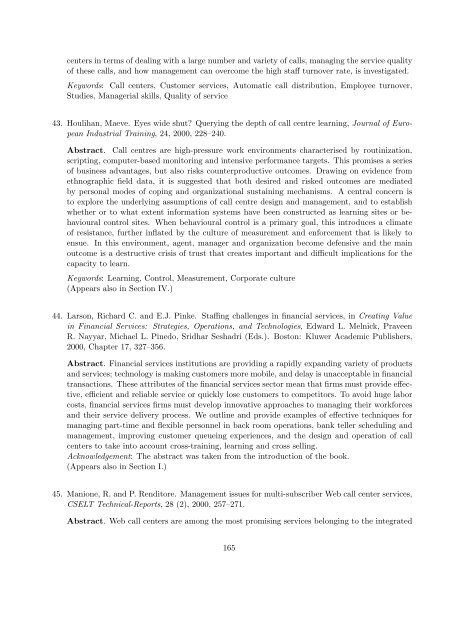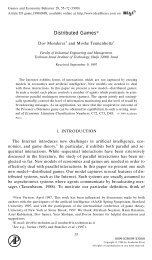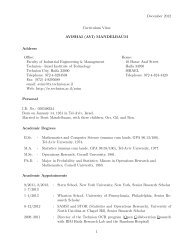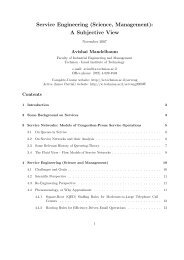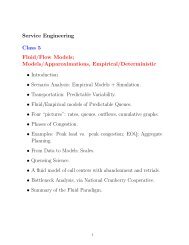CALL CENTERS (CENTRES) - Faculty of Industrial Engineering and ...
CALL CENTERS (CENTRES) - Faculty of Industrial Engineering and ...
CALL CENTERS (CENTRES) - Faculty of Industrial Engineering and ...
Create successful ePaper yourself
Turn your PDF publications into a flip-book with our unique Google optimized e-Paper software.
centers in terms <strong>of</strong> dealing with a large number <strong>and</strong> variety <strong>of</strong> calls, managing the service quality<br />
<strong>of</strong> these calls, <strong>and</strong> how management can overcome the high staff turnover rate, is investigated.<br />
Keywords: Call centers, Customer services, Automatic call distribution, Employee turnover,<br />
Studies, Managerial skills, Quality <strong>of</strong> service<br />
43. Houlihan, Maeve. Eyes wide shut? Querying the depth <strong>of</strong> call centre learning, Journal <strong>of</strong> European<br />
<strong>Industrial</strong> Training, 24, 2000, 228–240.<br />
Abstract. Call centres are high-pressure work environments characterised by routinization,<br />
scripting, computer-based monitoring <strong>and</strong> intensive performance targets. This promises a series<br />
<strong>of</strong> business advantages, but also risks counterproductive outcomes. Drawing on evidence from<br />
ethnographic field data, it is suggested that both desired <strong>and</strong> risked outcomes are mediated<br />
by personal modes <strong>of</strong> coping <strong>and</strong> organizational sustaining mechanisms. A central concern is<br />
to explore the underlying assumptions <strong>of</strong> call centre design <strong>and</strong> management, <strong>and</strong> to establish<br />
whether or to what extent information systems have been constructed as learning sites or behavioural<br />
control sites. When behavioural control is a primary goal, this introduces a climate<br />
<strong>of</strong> resistance, further inflated by the culture <strong>of</strong> measurement <strong>and</strong> enforcement that is likely to<br />
ensue. In this environment, agent, manager <strong>and</strong> organization become defensive <strong>and</strong> the main<br />
outcome is a destructive crisis <strong>of</strong> trust that creates important <strong>and</strong> difficult implications for the<br />
capacity to learn.<br />
Keywords: Learning, Control, Measurement, Corporate culture<br />
(Appears also in Section IV.)<br />
44. Larson, Richard C. <strong>and</strong> E.J. Pinke. Staffing challenges in financial services, in Creating Value<br />
in Financial Services: Strategies, Operations, <strong>and</strong> Technologies, Edward L. Melnick, Praveen<br />
R. Nayyar, Michael L. Pinedo, Sridhar Seshadri (Eds.). Boston: Kluwer Academic Publishers,<br />
2000, Chapter 17, 327–356.<br />
Abstract. Financial services institutions are providing a rapidly exp<strong>and</strong>ing variety <strong>of</strong> products<br />
<strong>and</strong> services; technology is making customers more mobile, <strong>and</strong> delay is unacceptable in financial<br />
transactions. These attributes <strong>of</strong> the financial services sector mean that firms must provide effective,<br />
efficient <strong>and</strong> reliable service or quickly lose customers to competitors. To avoid huge labor<br />
costs, financial services firms must develop innovative approaches to managing their workforces<br />
<strong>and</strong> their service delivery process. We outline <strong>and</strong> provide examples <strong>of</strong> effective techniques for<br />
managing part-time <strong>and</strong> flexible personnel in back room operations, bank teller scheduling <strong>and</strong><br />
management, improving customer queueing experiences, <strong>and</strong> the design <strong>and</strong> operation <strong>of</strong> call<br />
centers to take into account cross-training, learning <strong>and</strong> cross selling.<br />
Acknowledgement: The abstract was taken from the introduction <strong>of</strong> the book.<br />
(Appears also in Section I.)<br />
45. Manione, R. <strong>and</strong> P. Renditore. Management issues for multi-subscriber Web call center services,<br />
CSELT Technical-Reports, 28 (2), 2000, 257–271.<br />
Abstract. Web call centers are among the most promising services belonging to the integrated<br />
165


